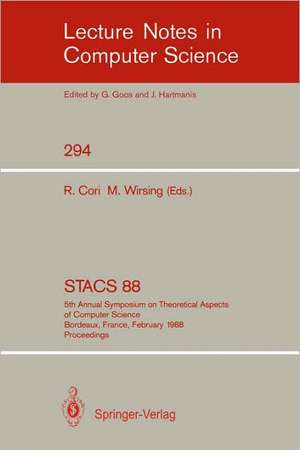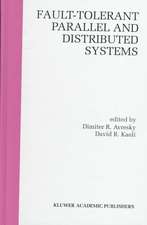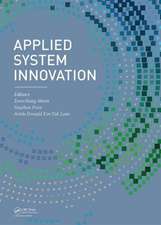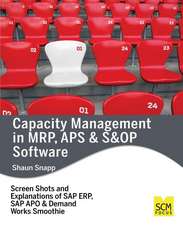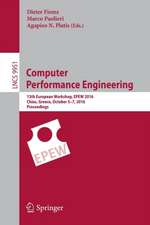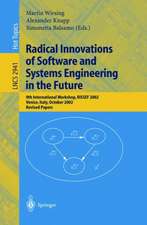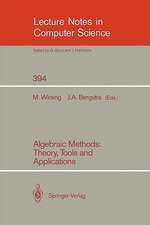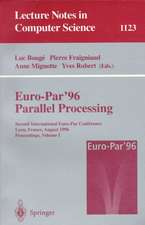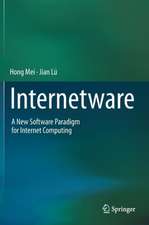STACS 88: 5th Annual Symposium on Theoretical Aspects of Computer Science, Bordeaux, France, February 11-13,1988; Proceedings: Lecture Notes in Computer Science, cartea 294
Editat de Robert Cori, Martin Wirsingen Limba Engleză Paperback – 27 ian 1988
Din seria Lecture Notes in Computer Science
- 20%
 Preț: 1061.55 lei
Preț: 1061.55 lei - 20%
 Preț: 307.71 lei
Preț: 307.71 lei - 20%
 Preț: 438.69 lei
Preț: 438.69 lei - 20%
 Preț: 579.30 lei
Preț: 579.30 lei -
 Preț: 410.88 lei
Preț: 410.88 lei - 17%
 Preț: 427.22 lei
Preț: 427.22 lei - 20%
 Preț: 596.46 lei
Preț: 596.46 lei - 15%
 Preț: 448.04 lei
Preț: 448.04 lei - 20%
 Preț: 353.50 lei
Preț: 353.50 lei -
 Preț: 389.49 lei
Preț: 389.49 lei - 20%
 Preț: 309.90 lei
Preț: 309.90 lei - 20%
 Preț: 645.28 lei
Preț: 645.28 lei - 20%
 Preț: 763.23 lei
Preț: 763.23 lei - 15%
 Preț: 580.46 lei
Preț: 580.46 lei - 20%
 Preț: 310.28 lei
Preț: 310.28 lei - 20%
 Preț: 655.02 lei
Preț: 655.02 lei - 20%
 Preț: 1183.14 lei
Preț: 1183.14 lei - 20%
 Preț: 340.32 lei
Preț: 340.32 lei -
 Preț: 449.57 lei
Preț: 449.57 lei - 20%
 Preț: 591.51 lei
Preț: 591.51 lei - 18%
 Preț: 938.83 lei
Preț: 938.83 lei - 20%
 Preț: 337.00 lei
Preț: 337.00 lei - 20%
 Preț: 649.50 lei
Preț: 649.50 lei - 20%
 Preț: 607.40 lei
Preț: 607.40 lei - 20%
 Preț: 1414.79 lei
Preț: 1414.79 lei - 20%
 Preț: 1024.44 lei
Preț: 1024.44 lei - 20%
 Preț: 583.40 lei
Preț: 583.40 lei - 20%
 Preț: 453.32 lei
Preț: 453.32 lei - 20%
 Preț: 575.49 lei
Preț: 575.49 lei - 20%
 Preț: 1075.26 lei
Preț: 1075.26 lei - 20%
 Preț: 585.88 lei
Preț: 585.88 lei - 20%
 Preț: 825.93 lei
Preț: 825.93 lei - 17%
 Preț: 360.20 lei
Preț: 360.20 lei - 20%
 Preț: 763.23 lei
Preț: 763.23 lei - 20%
 Preț: 340.32 lei
Preț: 340.32 lei - 20%
 Preț: 504.58 lei
Preț: 504.58 lei - 20%
 Preț: 369.13 lei
Preț: 369.13 lei - 20%
 Preț: 580.93 lei
Preț: 580.93 lei - 20%
 Preț: 343.62 lei
Preț: 343.62 lei - 20%
 Preț: 350.21 lei
Preț: 350.21 lei - 20%
 Preț: 583.40 lei
Preț: 583.40 lei - 20%
 Preț: 583.40 lei
Preț: 583.40 lei - 15%
 Preț: 438.59 lei
Preț: 438.59 lei - 20%
 Preț: 341.95 lei
Preț: 341.95 lei - 20%
 Preț: 238.01 lei
Preț: 238.01 lei - 20%
 Preț: 538.30 lei
Preț: 538.30 lei
Preț: 338.49 lei
Preț vechi: 423.11 lei
-20% Nou
Puncte Express: 508
Preț estimativ în valută:
64.77€ • 69.26$ • 54.00£
64.77€ • 69.26$ • 54.00£
Carte tipărită la comandă
Livrare economică 17 aprilie-01 mai
Preluare comenzi: 021 569.72.76
Specificații
ISBN-13: 9783540188346
ISBN-10: 3540188347
Pagini: 420
Ilustrații: XII, 408 p.
Dimensiuni: 216 x 279 x 22 mm
Greutate: 0.59 kg
Ediția:1988
Editura: Springer Berlin, Heidelberg
Colecția Springer
Seria Lecture Notes in Computer Science
Locul publicării:Berlin, Heidelberg, Germany
ISBN-10: 3540188347
Pagini: 420
Ilustrații: XII, 408 p.
Dimensiuni: 216 x 279 x 22 mm
Greutate: 0.59 kg
Ediția:1988
Editura: Springer Berlin, Heidelberg
Colecția Springer
Seria Lecture Notes in Computer Science
Locul publicării:Berlin, Heidelberg, Germany
Public țintă
ResearchCuprins
Geometry of numbers and integer programming.- Getting back to the past in the union-find problem.- On the construction of optimal time adders.- On computations with integer division.- Maintaining range trees in secondary memory.- Solving parametric problems on trees.- On the k-colouring of circle-graphs.- Functional equations for data structures.- The power of polynomial size ?-branching programs.- Collapsing oracle hierarchies, census functions and logarithmically many queries.- Domino games with an application to the complexity of boolean algebras with bounded quantifier alternations.- An automatic speed-up of random access machines with powerful arithmetic instructions.- Characterizing the polynomial Hierarchy by alternating auxiliary pushdown automata.- Hotz-isomorphism theorems in formal language theory.- First-order properties of trees, star-free expressions, and aperiodicity.- Cyclic rational transductions and polynomials of rational functions.- Construction of a family of finite maximal codes.- Fonctions Generatrices Transcendantes a Coefficients Engendres par Automates.- The relation of two patterns with comparable languages.- Hierarchical contextual rewriting with several levels.- Generalized bisimulation in relational specifications.- On polynomial time graph grammars.- An axiomatic definition of context-free rewriting and its application to NLC graph grammars.- Efficient distributed algorithms by using the archimedean time assumption.- A simple protocol for secure circuit evaluation.- Scheduling independent jobs on hypercubes.- Voronoi diagrams based on general metrics in the plane.- Geometric containment, common roots of polynomials and partial orders.- Extension of the notion of map and subdivisions of a three-dimensional space.- An optimal algorithm fordetecting weak visibility of a polygon.- Polygon placement under translation and rotation.- On the existence of the minimum asynchronous automaton and on decision problems for unambiguous regular trace languages.- On morphisms of trace monoids.- An automaton characterization of fairness in SCCS.- A compositional semantics for Concurrent Prolog.- Functions and relations: The graal system.- LPC: A concurrent programming laboratory.- Darwin: Computer algebra and enumerative combinatorics.- Some tools for an inference laboratory (ATINF).- Modulog and the Modula workstation.- The granules, glutton: An idea, an algorithm to implement on multiprocessor.- Prototype de Venus: Un Outil d'Aide a la Verification de Systemes Communicantes.- PLEXUS: A system for implementing hierarchical graph algorithms.
